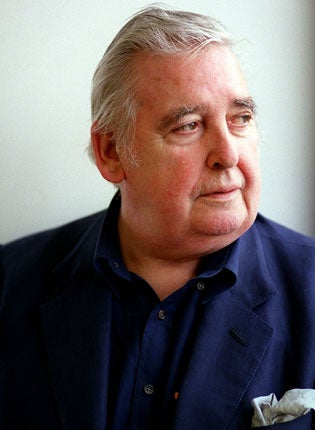Farewell to Alan Watkins the Fleet Street giant

Your support helps us to tell the story
From reproductive rights to climate change to Big Tech, The Independent is on the ground when the story is developing. Whether it's investigating the financials of Elon Musk's pro-Trump PAC or producing our latest documentary, 'The A Word', which shines a light on the American women fighting for reproductive rights, we know how important it is to parse out the facts from the messaging.
At such a critical moment in US history, we need reporters on the ground. Your donation allows us to keep sending journalists to speak to both sides of the story.
The Independent is trusted by Americans across the entire political spectrum. And unlike many other quality news outlets, we choose not to lock Americans out of our reporting and analysis with paywalls. We believe quality journalism should be available to everyone, paid for by those who can afford it.
Your support makes all the difference.Alan Watkins's son David was about to read him fellow columnist Simon Hoggart's article on the General Election fallout when he realised that his father had died. "Rather an extreme reaction," said Robert Harris, another fine political writer, in his address at yesterday's funeral.
Watkins departed the stage as he would have wished, the subject of a waspish anecdote. He cannot have arranged that, but he had specified the rest of his funeral with precision. "Bread of Heaven" for the congregation and "All Through the Night" (or "Ar Hyd y Nos" as it was in the order of service) for the superb choir of St Bride's, the journalists' church off Fleet Street. Fleet Street was, of course, the place and the collective noun in which Watkins worked and the history of which he chronicled better than any other.
So the funeral was at St Bride's and the reception at the Garrick, where Watkins had been a member for more than 30 years. It was a celebration of a life devoted to the love of politics, wine (he invested his winnings on Michael Foot to be leader of the Labour Party in champagne), music and above all, fine writing.
The roll call of Fleet Street and now Fleet Street Diaspora editors traced the later stages of Watkins's career. Paul Johnson, former editor of the New Statesman, where Watkins had been political columnist after The Sunday Express, where he started his career as journalist in 1963, and The Spectator; Donald Trelford, former editor of The Observer; Ian Jack, former editor of The Independent on Sunday, for which he was still writing a weekly column until three weeks before he died.
It was attended by some of the best names of the "rough old trades" of politics and journalism. William Keegan, Richard Ingrams, Simon Hoggart, Stephen Fay, Alexander Chancellor, Francis Wheen, Michael White, James Naughtie and Dominic Lawson - not young fogeys exactly, a term Watkins is supposed to have invented, but all admirers of his defiantly old-fashioned devotion to the craft of writing, a craft that he more than most made seem effortless.
Anthony Howard gave one reading; Geoffrey Wheatcroft another; Sir Peter Tapsell, the Father of the House of Commons, was in the congregation, as was Roy Hattersley. That gave Robert Harris the chance to read from Watkins's column in which he discussed, at some length, why Hattersley was not a suet pudding.
The other address was given by Gerald Davies, former Welsh rugby international and writer, partly about Watkins's other great love, although, as with Watkins's writing, the fondness for rugby was indistinguishable from a love of the English language. Davies also spoke about Watkins's roots in the Welsh valleys
Typically, Watkins chose the drinking song from Verdi's La Traviata as the last piece of music for the choir. Leave them with a smile on their faces, you could almost hear him saying.
Join our commenting forum
Join thought-provoking conversations, follow other Independent readers and see their replies
Comments